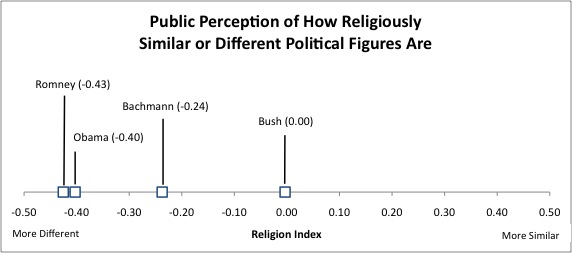
While President Barack Obama and GOP presidential candidate Mitt Romney may have different religious backgrounds, they share a surprisingly similar religious dilemma: most Americans can't correctly identify their religion, and more Americans than not say that each of these leader's religious beliefs are different from their own.
Much ink has already been spilled about the challenge Mitt Romney may face because of negative public perceptions of his Mormon faith. But the new PRRI/RNS Religion News Survey, conducted by Public Religion Research Institute in partnership with Religion News Service, shows that at this point in the campaign only four-in-10 Americans correctly identify Romney's religion as Mormon. Ten percent identify him as either Protestant or Catholic, and 46 percent say they don't know what his religious beliefs are.
Despite a very public falling out with his church pastor during the campaign and providing numerous testimonials of his Christian faith, President Obama faces a similar knowledge gap with the public. Only about four-in-10 (38 percent) correctly identify his religion as Christian, 18 percent continue to wrongly identify him as Muslim and 40 percent say they do not know what his religious beliefs are.
Beyond the religious identity challenge, both Obama and Romney also face a religious identification challenge with the public. Specifically, more Americans than not say that each of these leader's religious beliefs are different from their own. Romney of course faces a hurdle here that Obama does not: 72 percent of Americans report that Mormons have religious beliefs that are somewhat or very different from their own. But any advantage that might accrue to Obama because of his more familiar Christian faith is not evident in the numbers. The number of Americans saying Obama has religious beliefs that are different from their own stands at 48 percent, a number that is slightly higher than the same measure for Mitt Romney (43 percent).

In order to measure the average distance between Americans' own religious beliefs and their perceptions of political leaders' religious beliefs, we created a scale that accounts for perceptions of both similarity and difference. On this scale, former President George W. Bush provides a helpful benchmark. Bush scores right at the mean of the scale (0.00), indicating that equal numbers say his religious beliefs are similar to their own and different from their own. On this measure, again, Obama's score is nearly identical to Romney's score (-0.40 and -0.43 respectively), indicating that for each, more Americans think these leaders' religious beliefs are different than think they are similar.
Why does all this matter? Because most Americans are religious, and religion remains a lens through which many evaluate political candidates and measure their identification with them. The impact of perceived differences in religious beliefs is clearly evident in a question measuring a hypothetical vote for president.
If the vote were held today among all Americans, 44 percent of Americans report they would vote for President Obama, compared to 36 percent who say they would vote for Romney. However, among those who say Obama's religious beliefs are somewhat or very different from their own, Romney wins over Obama 48 percent to 32 percent. Romney faces the same fate. Among those who say Romney's religious beliefs are somewhat or very different from their own, Obama comes out strongly ahead 55 percent to 28 percent.
Much has been written about the challenges Romney may face because of his Mormon religious identity. But Obama's continued religious identity and identification problems, which are, if different, as significant as Romney's, have not been fully grasped. Should these perceptions hold throughout the 2012 campaign, they could have significant electoral repercussions at the ballot box.
The PRRI/RNS Religion News Survey was designed and conducted by Public Religion Research Institute in partnership with Religion News Service. Results of the survey were based on RDD telephone interviews conducted between July 14 and July 17 by professional interviewers under the direction of Opinion Research Corporation. Interviews were conducted among a random sample of 1,012 adults 18 years of age or older living in private households in the continental United States. The margin of error for the survey is +/- 3.0 percentage points at the 95 percent level of confidence.
This article was originally posted by Dr. Jones on his new blog "Figuring Faith" at the Washington Post's On Faith section.